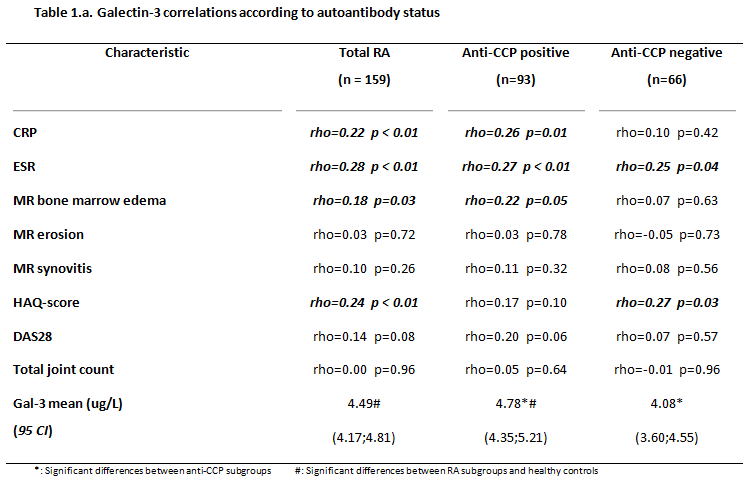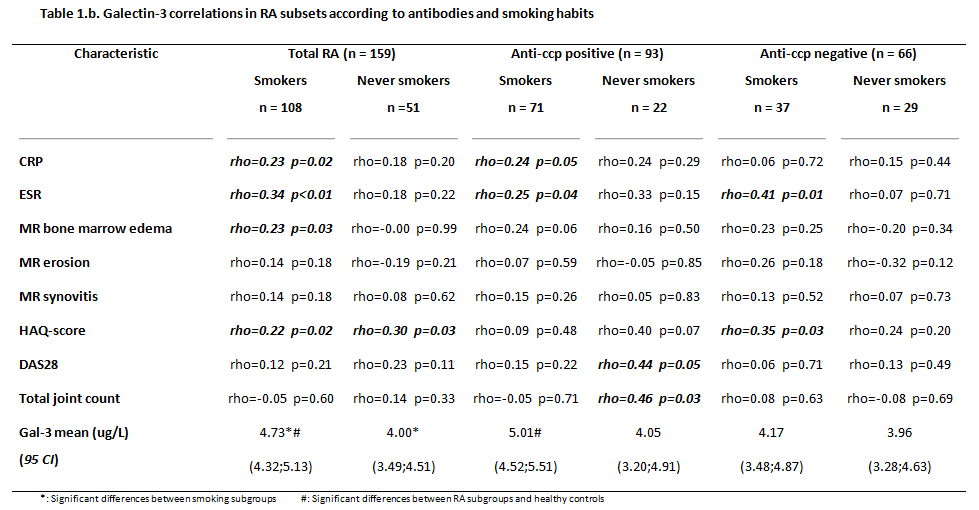Session Information
Title: Rheumatoid Arthritis - Clinical Aspects: Novel Biomarkers and Other Measurements of Disease Activity
Session Type: Abstract Submissions (ACR)
Background/Purpose: Galectin-3 (Gal-3), a 26kD beta-galactoside binding protein, has been implicated as a pro-inflammatory mediator in animal arthritis and rheumatoid arthritis (RA) in humans. Thus, Gal-3 is overexpressed by fibroblast-like synoviocytes in the rheumatoid synovium, particularly upon adhesion to cartilage components. Moreover, Gal-3 is increased in serum in animal arthritis and in serum and synovial fluid in patients with long-standing RA as compared with osteoarthritis and healthy individuals.
The aims of this investigation were to quantify the serum level of Gal-3 in a large cohort of patients with newly diagnosed RA before treatment, and to study possible associations with clinical, serological and imaging findings.
Methods: One hundred and sixty DMARD naïve patients with RA of recent onset were included (the CIMESTRA cohort)(1). One hundred and nineteen volunteer blood donors served as healthy controls. Variables included demographics, clinical disease measures (Disease Activity Score in 28 joints-DAS28, Health Assessment Questionnaire-HAQ, Visual Analog Scales– patients global assessment, pain and physicians assessment), autoantibody status and MRI of the non-dominant wrist. Gal-3 was measured by ELISA (R&D)
Results: Gal-3 was significantly increased in RA patients, 4.49 ug/L (95% CI 4.17;4.81) compared with healthy controls, 3.96 ug/L (3.70;4.22; p = 0.02).
Gal-3 correlated positively with Capsular Reactive Protein (CRP), Erythrocyte Sedimentation Rate(ESR), and HAQ, but not with joint counts, DAS28 or rheumatoid nodules (table 1.a). Stratification according to autoantibody seropositivity and smoking showed that Gal-3 was significantly higher in seropositive than in seronegative RA, particularly in smokers (table 1.b). A similar pattern was observed in IgM-RF only and IgM-RF+anti-CCP positive subsets (p = 0.01 and p = 0.03). There was no association between Gal-3 and anti-ccp titer. By contrast, Gal-3 was positively correlated with bone marrow edema in patients (p = 0.03).
Conclusion : In this study we show that Gal-3 is increased in DMARD naïve patients with RA of recent onset. The associations with autoantibody seropositivity and bone marrow edema provide additional evidence for a role of Gal-3 in the RA disease pathway and hence that Gal-3 has potential as a seromarker for synovial pathology in RA.
Acknowledgements: We would like to thank The Danish Rheumatism Association for financial support.
References
1. HETLAND, M. L. et al. Arthritis Rheum. 2006, 54, 1401-9.
Disclosure:
S. F. Issa,
None;
A. F. Christensen,
None;
H. M. Lindegaard,
None;
M. L. Hetland,
None;
K. Hoerslev-Petersen,
None;
K. Junker,
None;
K. Stengaard-Pedersen,
None;
T. Lottenburger,
None;
T. Ellingsen,
None;
I. Hansen,
None;
J. K. Pedersen,
None;
U. B. Lauridsen,
None;
A. Svendsen,
None;
U. Tarp,
None;
J. Pødenphant,
None;
M. Østergaard,
Abbott/Abbvie, Centocor, Merck, Schering-Plough,,
2,
Abbott/Abbvie, BMS, Boehringer-Ingelheim, Eli-Lilly, Centocor, GSK, Janssen, Merck, Mundipharma, Novo, Pfizer, Schering-Plough, Roche UCB, and Wyeth.,
5;
P. Junker,
None.
« Back to 2014 ACR/ARHP Annual Meeting
ACR Meeting Abstracts - https://acrabstracts.org/abstract/galectin-3-in-the-systemic-circulation-is-increased-in-newly-diagnosed-rheumatoid-arthritis-and-is-associated-with-anti-ccp-and-bone-marrow-edema/


